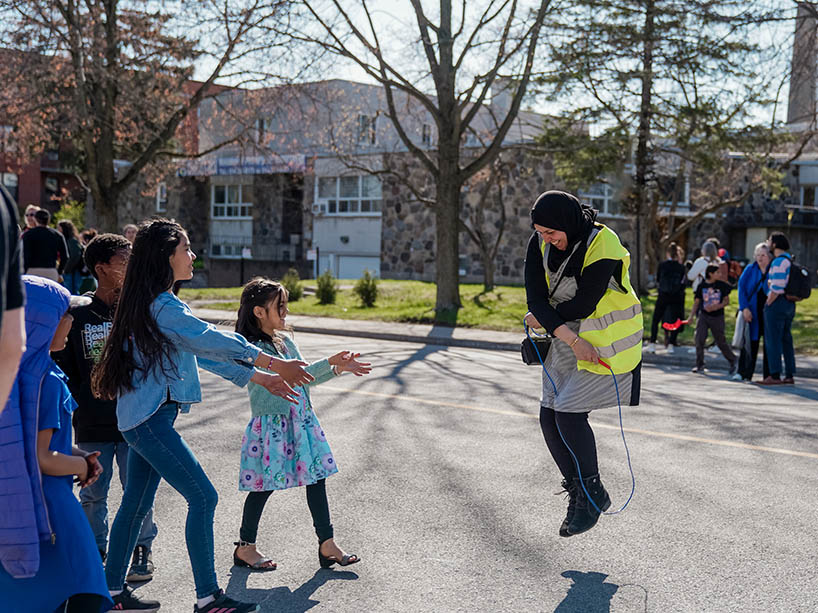National project to test car-free zones at schools receives $3M funding

Children play road hockey during a car-free streets pilot project in Montreal. TMU professor Raktim Mitra is collaborating on a new research project that will help communities implement car-free zones around schools. Photo by Joelle Simard-Lapointe.
As children head back to class and parents organize school pick-ups and drop-offs, a national research project is working to make children’s commute to school safer, more active and more independent.
Toronto Metropolitan University (TMU) professor Raktim Mitra is one of the lead researchers on the National Active School Streets Initiative. The goal of the project is to help participating communities successfully plan, implement and evaluate car-free zones around schools, which encourage students to walk and bike to school while finding moments of play and independence with their peers along the way.
The collaborative, cross-country project recently received $3 million from the Public Health Agency of Canada (PHAC) to accelerate the implementation of School Streets across Canada.
“There have been previous pilot projects in Toronto and other cities,” said School of Urban and Regional Planning professor Mitra. “This project is a way for us to synchronize all those ad hoc efforts and create national level capacity to create School Streets across Canada. The ultimate goal is to generate nationwide momentum for safer, healthier and happier environments surrounding our schools.”
Professor Mitra says local organizations and municipalities that ran pilot projects in the past did not have the resources or capacity to sustain them in the long term. The national initiative is aiming to develop a scalable School Streets program that can be sustained in cities nationwide. The initiative is aimed at improving both children’s physical and social well-being.
“Over the past few decades, researchers and practitioners have noticed some concerning trends among today's children and youth, including a significant lack of physical activity. Walking and biking to and from school offers opportunities to be physically active, but traffic safety along school routes is a key concern for many,” said professor Mitra.
“At the same time children have very limited license to do things on their own without being supervised by their parents. The ability to independently make decisions and move within our neighborhoods have important implications for children's physical and social health,” he said.

The Active School Streets research project will allow for more independence and play before and after school. Photo by Joelle Simard-Lapointe.
As an expert in active transportation and mobility within the urban context, professor Mitra is interested in discovering if the initiative will have measurable benefits to children’s safety, well-being and levels of physical activity.
“As researchers, this is a great opportunity for us,” said professor Mitra. “School Streets may offer multiple benefits to the community, but empirical evidence of such benefits is less common. Conducting a national-level pilot study that involves multiple schools in multiple cities in Canada will allow us to generate those insights.”
Professor Mitra will lead the evaluation of the initiative at two Mississauga schools during the 2025-2026 school year. He will collect data on the number of participants, their socio-demographic background and changes to children’s physical activity patterns.
This research will increase understanding of how School Streets affect communities, particularly among underrepresented groups such as low-income, racialized and immigrant populations. Professor Mitra will also investigate the impact of School Streets on the community at large, from traffic behavior and congestion to changes in air quality.
In addition to Mississauga, the year-long School Streets initiative will be implemented in Kingston, Montreal and Vancouver, with smaller-scale initiatives in 11 other communities across Canada.
The National Active Schools Streets Initiative is a collaboration between not-for-profit organizations Green Communities Canada, 8 80 Cities, Centre d’écologie urbaine, research institutions Toronto Metropolitan University, Université de Montréal, University of British Columbia and Queen’s University, and 16 community partners from British Columbia, Alberta, Manitoba, Ontario, Quebec, and New Brunswick.
Learn more about School Streets. (external link)
Related stories





